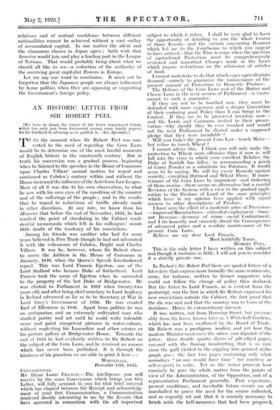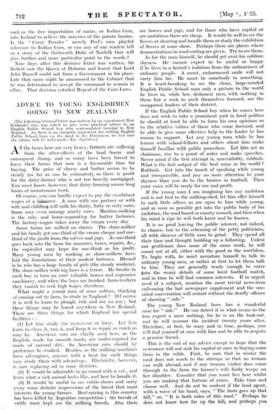AN HISTORIC LETTER FROM SIR ROBERT PEEL
[Wo have to thank the owner of the letter reproduced below, Which has only just been discovered among some family papers, for his kindnom in allowing us to publish it.—ED. Spectator.] TO fix the moment when Sir Robert Peel was con- verted to the need of repealing the Corn Laws would be to determine one of the most fateful moments of English history in the nineteenth century. But in truth his conversion was a gradual process, beginning when he listened to the speeches in the House of Commons upon Charles Villiers' annual motion for repeal and continued as Cobden's oratory within and without the House increased the influence of the Anti-Corn Law League. Most of all it was due to his own observation, to what he saw with his own eyes of the condition of the country and of the sufferings of the people ; and to the results that he traced to reductions of tariffs already made in other directions. At any rate, we know from his Memoirs that before the end of November, 1845, he had reached the point of circulating in the Cabinet confi- dential memoranda which left in his colleagues' minds little doubt of the tendency of his convictions.
Among his friends was another who had for sonic years believed in Free Trade though he had not advocated it with the vehemence of Cobden, Bright and Charles Villiers. It was he, however, whom Sir Robert chose to move the Address in the House of Commons in January, 1846, when the Queen's Speech foreshadowed repeal. This was Lord Francis Egerton, son of the Lord Stafford who became Duke of Sutherland: Lord Francis took the name of Egerton when he succeeded to the property of the last Duke of Bridgewater. He was elected to Parliament in 1822 when twenty-two years old, and after being chief secretary to Lord Anglesey in Ireland advanced so far as to be Secretary at War in Lord Grey's Government of 1830. He was created Earl of Ellesmere in 1846. Apart from politics he was an antiquarian and an extremely cultivated man who studied poetry and art until he could write tolerable verse and paint competent pictures in water-colours, without neglecting his Lancashire and other estates or his picture gallery at Bridgewater House. Towards the end of 1845 he had evidently written to Sir Robert on the subject of the Corn Laws, and he received an answer which has never been published. It is through the kindness of his grandson we are able to print it here :—
WMTERALL,
December 11th, 1845.
CONFIDENTIAL.
MY DEAR Lorin FRANCIS,—The intelligence you will receive by the same Conveyance which brings you this Letter, will fully account to you for that brief interval which has elapsed between the Receipt and acknowledg- ment of your first Communication, a Communication rendered doubly interesting to me by the Events that have occurred in connection with the all important subject to which it refers. I shall be very glad to have the opportunity of detailing to you the whole Course of those Events—and the various concurring Reasons which led me to the Conclusion to which you appear to have arrived—that the Time is conic when the question of agricultural Protection must be comprehensively reviewed and important Changes made in the Laws wlaich impose restrictions on the admission of articles of food.
I cannot undertake to do that which eager agriculturists . demand—namely to guarantee the maintenance of the present amount of Protection to Domestic Produce. The Defence of the Corn Laws and of the Butter and Cheese Laws in the next session of Parliament—is tanta- mount to such a guarantee. If they are not to be touched now, they must be defended with more eagerness and a deeper Conviction of their enduring good Policy than I can bring to the Contest. If they arc to be preserved inviolate now— and the Lords and Commons incited to their preser- vation—why should they be ever touched and would not the next Parliament be elected under a supposed pledge that they were inviolable ? Will you tinker the present Corn Law—touch Maize— but refuse to touch Wheat ?
I cannot advise this. I think you will only make the protection to Wheat more offensive than it now is, will fall into the error in which your excellent Relative the Duke of Norfolk has fallen—in recommending a pinch of Curry Powder as a substitute for Potatoes. It would seem to be saying, We will try every Remedy against scarcity, excepting Oatmeal and Wheat Flour. If main- tenance of the Corn Laws be imprudent—and tinkering of them unwise—there seems no alternative but a careful Revision of the System with a view to the gradual appli- cation to the Produce of Land of the same principles which have in my opinion been applied with signal. success to other descriptions of Produce. • I have seen the effect of a moderate price of Provisions —improved Manufactures—extended employment—buoy- ant Revenue—decrease of crime—social Contentment, and I do honestly and sincerely dread the Consequences of advanced prices and a resolute maintenance of the present Corn Laws. Believe me my dear Lord Francis, Most faithfully Yours,
ROBERT PEEL.
This is the only letter I have written on this subject and though it contains so little, I will ask you to consider it a strictly private one.
In Parker's Sir Robert Peel there are quoted letters of a later date that express more formally the same sentiments, some, for instance, written to former supporters who could not follow the change of policy then declared. But the letter to Lord Francis, as is evident from the postscript, was the first in which Sir Robert expressed his new convictions outside the Cabinet, the first proof that the die was cast and that the country was to learn of the decisions. Hence its extraordinary interest.
It was written, not from Downing Street, but presum- ably from his house known later as 4 Whitehall Gardens, which has now been swallowed by the Board of Trade. Sir Robert was a prodigious worker, and yet how the modern Minister must envy the otium cum dignitate of the letter ; three double quarto sheets of gilt-edged paper, covered with the flowing handwriting that is so rare since the quill yielded to the niggling wire-pointed stylo- graph pen ; the first two pages containing only what nowadays " no one would have time " (or courtesy or self-respect) to write. Yet as the writer proceeds how concisely he puts the whole matter from the points of view of the Administration, of the Opposition, and of a representative Parliament generally. Past experience, present conditions, and inevitable future events arc all marshalled to prove the need for the course indicated, and so cogently set. out that it is scarcely necessary to brush aside the half-measures that had been proposed, such as the free importation of maize, or Indian Corn, into Ireland to relieve the miseries of the potato famine. Is the " Curry Powder " merely Peel's own playful reference to Indian Corn, or can any of our readers tell us a story of the thirteenth Duke of Norfolk that will give further and more particular point to the words ? Nine days after this decisive letter was written, Sir Robert saw the Queen at Osborne and learnt that Lord John Russell could not form a Government in his place. Late that same night he announced to the Cabinet that he was determined to accept the command to remain in office. That decision entailed Repeal of the Corn Laws.











































 Previous page
Previous page